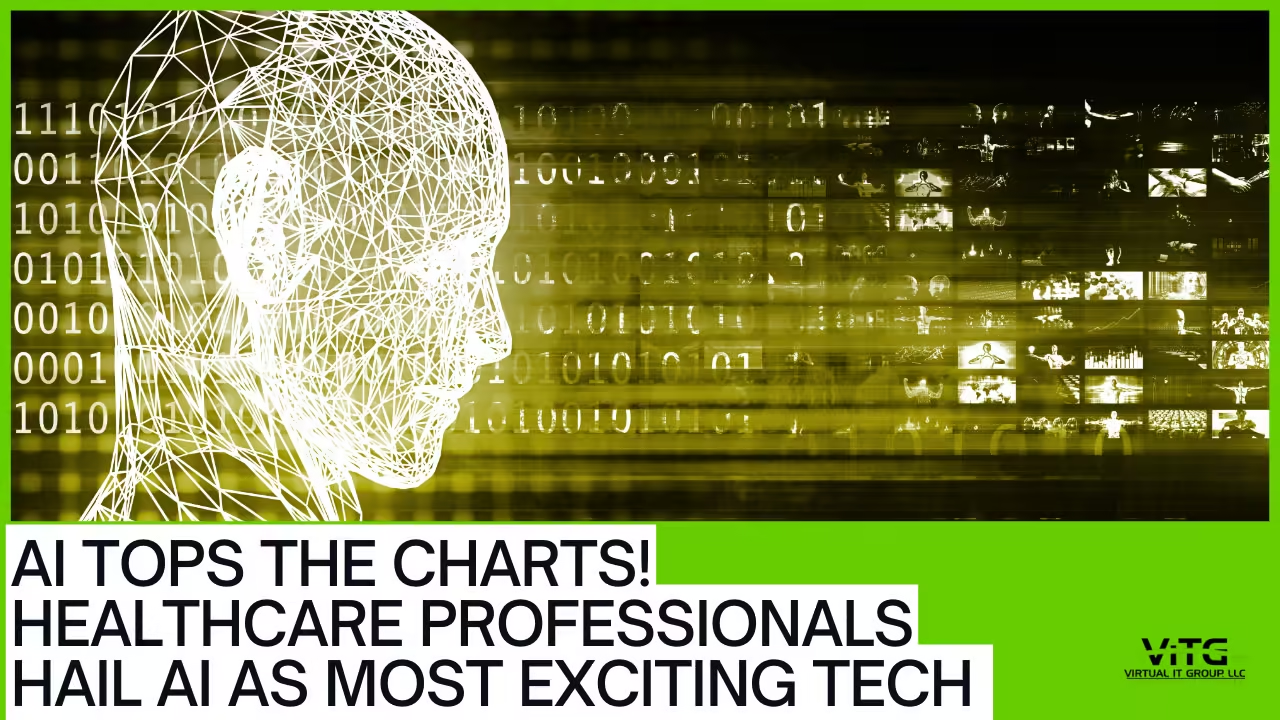In recent years, artificial intelligence (AI) has made its way to the forefront of technological advancements, and healthcare professionals are taking notice. As the world embraces AI in various industries, the healthcare sector has been particularly vocal about the transformative potential of AI technologies. From diagnosing diseases to managing patient data, AI is revolutionizing healthcare in ways we could only imagine a decade ago.
Healthcare professionals are hailing AI as one of the most exciting technologies of our time. Its potential to improve patient care, optimize workflows, and even save lives is pushing the industry toward a more efficient and innovative future. In this article, we’ll explore why AI is topping the charts in healthcare, its applications, and the future of this game-changing technology.
How AI is Revolutionizing Healthcare

AI’s impact on healthcare is multifaceted, with numerous benefits spanning from improved diagnostics to streamlined administrative tasks. Here are some key areas where AI is making a profound difference:
- Enhancing Diagnostics and Early Detection
AI algorithms have proven highly effective at identifying patterns in medical data, making them invaluable for diagnostics. By analyzing medical imaging data, AI can assist doctors in detecting abnormalities such as tumors, fractures, and other health issues much earlier than traditional methods. One example of this is the use of AI in radiology. AI-powered systems can scan and interpret radiographic images in mere seconds, enabling quicker diagnoses.
Breast cancer detection is a prime example of AI’s success in diagnostics. Research has shown that AI systems can outperform human radiologists in detecting cancer from mammograms by identifying minute differences that may go unnoticed by the human eyeetection leads to timely treatment, increasing survival rates and overall patient outcomes.
Learn more about AI’s role in cancer detection.
- Personalized Medicine and Treatment Plans
AI is also empowering the healthcare industry to shift toward personalized medicine, where treatments are tailored to the individual’s unique genetic makeup, lifestyle, and health history. By analyzing vast amounts of patient data, AI systems can predict how a person might respond to specific treatments, allowing doctors to craft more effective treatment plans.
For example, in the realm of pharmacology, AI can analyze a patient’s genetic information to predict how they’ll metabolize different medications. This means doctors can avoid the trial-and-error approach of prescribing medication and instead offer treatments that are more likely to succeed the first time.
This precision in treatment not only increases patient satisfaction but also reduces the likelihood of adverse side effects and lowers overall healthcare costs. Explore more about AI-driven personalized medicine.
- Streamlining Administrative Workflows
Healthcare professionals spend a significant amount of time on administrative tasks, such as filling out electronic health records (EHRs), scheduling appointments, and managing billing. AI-powered tools are automating these routine processes, allowing doctors and nurses to focus more on patient care rather than paperwork.
AI’s impact on EHRs is especially notable. Natural language processing (NLP) algorithms can interpret and summarize patient notes, automatically input data into the system, and even flag inconsistencies or potential errors. This not only reduces the administrative burden on healthcare providers but also ensures greater accuracy in medical records. AI scheduling tools can also optimize appointment bookings, taking into account patient preferences, doctor availability, and the urgency of the case.
As healthcare professionals spend less time on these tedious tasks, they can devote more energy to improving patient care. Find out how AI is optimizing healthcare administration.
AI’s Role in Predictive Analytics for Healthcare
One of AI’s most exciting applications in healthcare is predictive analytics. AI can analyze historical data from millions of patients to predict future health trends, identify at-risk populations, and even foresee disease outbreaks. This ability to predict and prevent diseases before they occur is changing the way healthcare providers approach public health and preventive care.
For example, AI systems can use predictive analytics to identify patients at risk of developing chronic conditions such as diabetes or heart disease. By recognizing these risk factors early, healthcare providers can implement preventive measures, such as lifestyle changes or medication, to reduce the chances of the disease progressing. Learn how predictive analytics is shaping healthcare.
Another groundbreaking application of predictive analytics is in epidemiology. During the COVID-19 pandemic, AI played a critical role in predicting the spread of the virus, helping healthcare systems prepare and allocate resources effectively. The future of pandemic management will undoubtedly continue to rely heavily on AI-driven predictive models.
AI-Powered Robotic Surgery: Precision Like Never Before
Surgical procedures are also being transformed by AI, particularly through robotic surgery. Robotic systems guided by AI can assist surgeons in performing highly precise procedures, which can reduce the risk of human error and improve patient outcomes. These systems provide real-time feedback to the surgeon, offering enhanced control and the ability to make micro-adjustments that would be impossible for the human hand.
One such example is the da Vinci Surgical System, which allows for minimally invasive procedures with smaller incisions, shorter recovery times, and fewer complications. AI’s role in these robotic systems extends beyond mere automation—it offers predictive insights, suggesting the best surgical path and alerting the surgeon to potential complications.
Robotic surgery, combined with AI, represents the future of surgical precision, providing patients with safer and more efficient outcomes. Explore the latest advancements in robotic surgery.
The Future of AI in Healthcare: What Lies Ahead?
As AI continues to advance, its integration into healthcare will only deepen. The future of AI in this field looks bright, with ongoing research and development aimed at pushing the boundaries of what AI can achieve. Here are a few trends to watch for in the coming years:
AI-Powered Diagnostics on the Go
Wearable devices, already widely used to track fitness and health metrics, are being outfitted with AI algorithms to provide real-time diagnostic capabilities. These devices will soon be able to monitor vital signs, detect irregularities, and alert healthcare providers to potential health issues, all while the patient goes about their daily life. This will revolutionize the concept of remote patient monitoring, reducing hospital visits and allowing for early intervention.
AI in Drug Discovery
AI is also poised to disrupt the pharmaceutical industry, particularly in the field of drug discovery. Traditionally, developing new drugs can take years and cost billions of dollars. However, AI can drastically speed up this process by identifying promising drug candidates more quickly, testing them in virtual simulations, and predicting their efficacy. This could lead to the faster development of life-saving medications for a variety of conditions. Learn more about AI in drug discovery.
Conclusion
AI has earned its place as one of the most exciting and transformative technologies in healthcare. From enhancing diagnostics and personalizing treatment plans to streamlining workflows and revolutionizing surgery, AI is already making a significant impact. As we look to the future, the potential for AI to improve healthcare outcomes and enhance the overall patient experience is limitless.
For healthcare organizations and businesses looking to leverage AI in their operations, it’s essential to stay ahead of the curve. Virtual IT Group is dedicated to helping healthcare providers adopt cutting-edge technologies, including AI solutions that can optimize patient care and streamline operations. Visit Virtual IT Group to explore how we can help your organization harness the power of AI for a healthier tomorrow.

